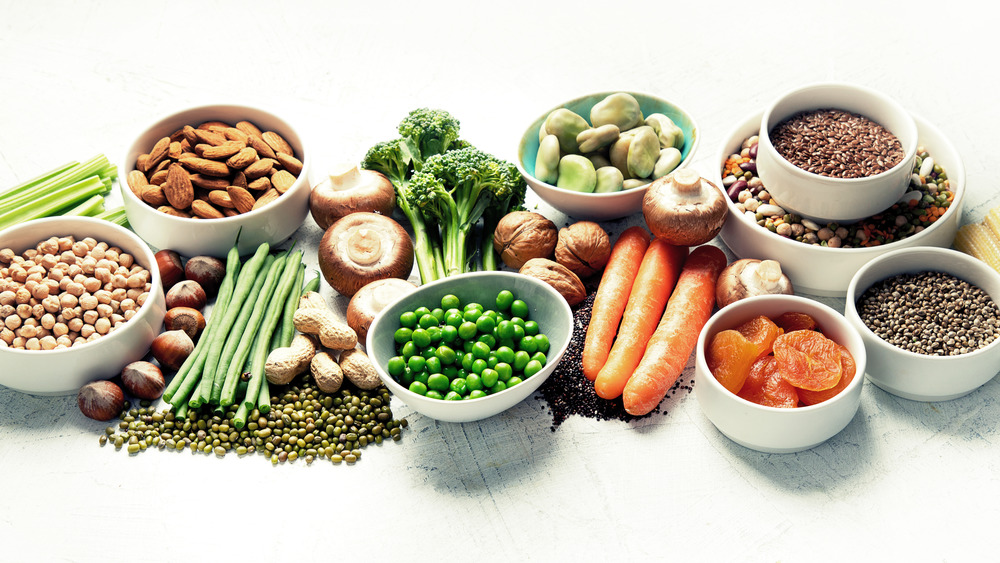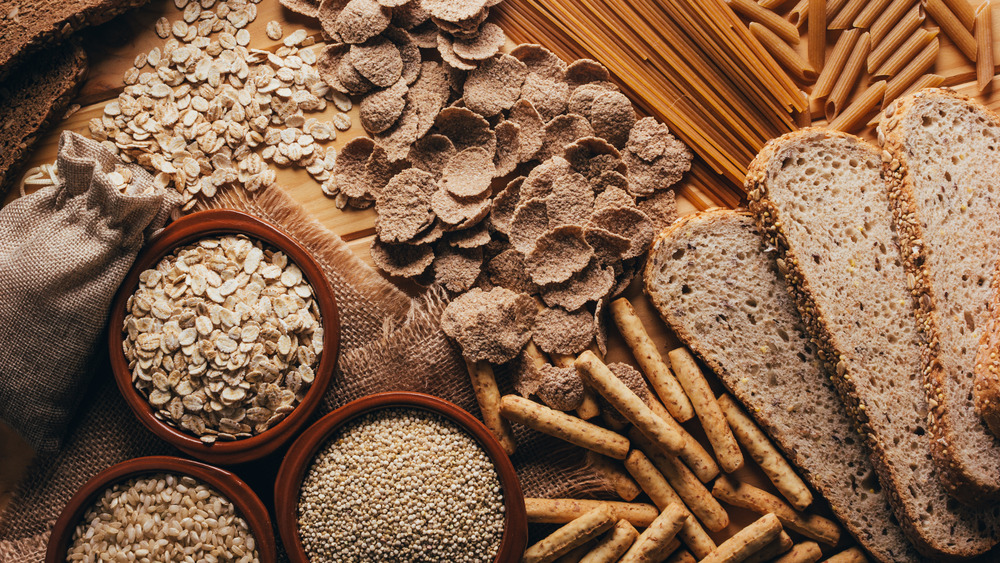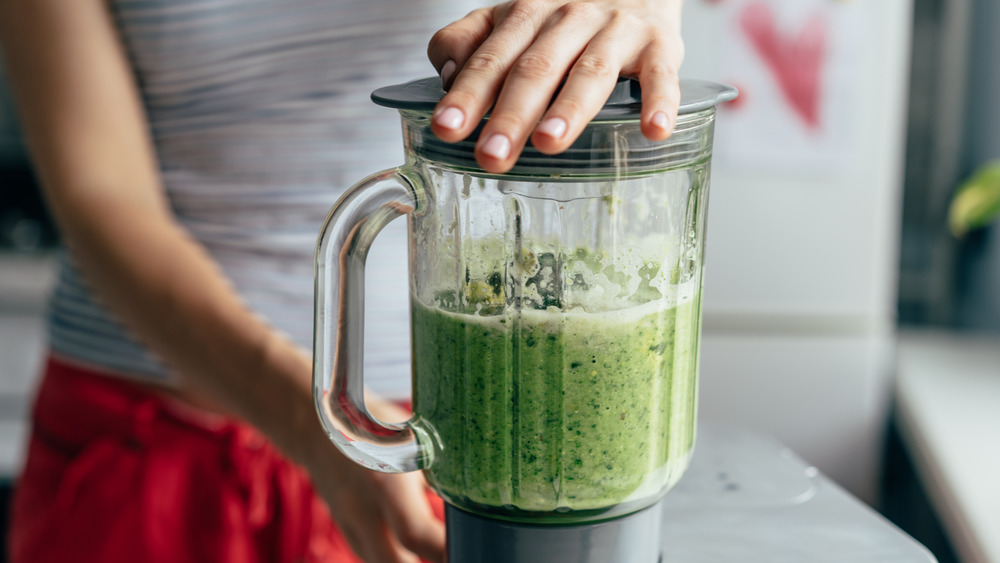If You're Always Hungry, This Is Probably Why
Are you actually hungry or are you eating that bowl of ice cream because it just tastes so stinkin' good? If you feel like you constantly need food, it's important to determine whether you're really hungry or if you're just eating out of habit or for other reasons.
Recognizing and feeding your hunger isn't exactly a simple process. According to WebMD, hunger hormones in your blood and empty stomach signal the brain when you're hungry. Next, nerves in your stomach let your brain know that you're full. But this doesn't happen right away; it can take up to 20 minutes for the brain to get the message.
Pay attention to your hunger pains and behaviors, and adopt healthy ones, like taking care not to be ravenous when sitting down for a meal. You want to be hungry, not ready to consume a whole city like King Kong. And don't stop when you're so stuffed you barely move; stop when you're comfortably full. If you find you're always hungry, though, it could be one (or more) of the following reasons.
You may not be getting enough protein if you're hungry all the time
Protein is essential in your diet. Along with fats and carbohydrates, proteins are nutrients that provide calories. The U.S. Department of Agriculture described proteins as "building blocks" for bones, muscles, cartilage, skin, blood, enzymes, hormones, and vitamins. Clearly, they do a lot to keep your body humming along. That includes staving off hunger.
A 2006 study in Cell Metabolism found that a high-protein diet increases a hunger-fighting hormone called peptide YY (PYY). In the study, this hormone reduced food intake by one-third when given by injection. A study conducted five years later and published in Obesity found that obese men on a higher protein diet were more full throughout the day compared to those on a normal protein diet. They also weren't as preoccupied with food.
As for how much protein you need, the National Academy of Medicine recommends that adults get just over 7 grams for every 20 pounds of body weight, or anywhere from 10 to 35 percent of calories daily, according to The Nutrition Source. High-quality high-protein foods include eggs, edamame, cottage cheese, chicken, black beans, Greek yogurt, and more.
You may not be sleeping enough if you're hungry all the time
Sleep is a basic human need, and even though it may not feel like it, our bodies are busy while we're catching some shut-eye. Whether it's making sure our brains do their jobs or helping our immune systems stay healthy, sleep is essential. It also affects the hormones that make you feel hungry (ghrelin) or full (leptin).
As the Sleep Foundation explained, when you don't get enough sleep, your level of ghrelin raises while leptin lowers. Studies have confirmed this link, including one from 2007 published in Sleep Medicine Clinics. The study concluded that partial sleep deprivation results in ghrelin and leptin changes, leading to an increase in appetite.
So how much sleep do you need? The Sleep Foundation recommendations are between seven and nine hours of sleep for healthy adults. If you're over 65, you need more sleep –- at least seven to eight hours a night.
If you're hungry all the time, you may be eating too many refined carbs
Balanced diets should include carbohydrates, but there's a difference between the healthy kind and the unhealthy kind. Unprocessed carbs are good for you because they have fiber, vitamins, and minerals. Processed carbs have all that good stuff removed, turning them into refined carbs –- otherwise known as empty carbs or empty calories (via Medical News Today). They're labeled this way because they only give you a short burst of energy. Additionally, they don't fill you up the right way due to the lack of important nutrients.
Refined carbs are mainly in refined grains and sugars like white flour bread and tortillas, breakfast cereals, white rice, et cetera. Instead of white bread, try whole grain bread, or oatmeal instead of breakfast cereal. Because manufacturers use different names for refined sugars, Medical News Today said to check nutrition labels for the following ingredients: syrup, molasses, sweetener, fructose, sucrose, maltose, and dextrose.
If you're frequently hungry, your diet may be too low in fat
Dietary fat is important, as long as you don't have too much. On the flip side, not having enough is also detrimental. These fats help with cell growth, nutrient absorption, hormone production, organ protection, warmth, and energy (via American Heart Association). The healthiest fats are monounsaturated and polyunsaturated fats.
Unfortunately, as HuffPost reported, carbs are often added to replace calories lost from fat when low-fat food is manufactured. An example was given of a low-fat doughnut, which has as many or more calories than the "high-fat" version, but you'd need to eat two to feel as full.
Low-fat diets were part of a 2011 Obesity study that took place over the course of two years. Researchers evaluated the effect of low-carb and low-fat diets on food cravings, food preferences, and appetite. Participants on a low-fat diet were more bothered by hunger compared to those on the low-carb diet.
If you're constantly hungry, you may not be drinking enough water
While our bodies need water to survive, many of us don't drink enough of it. And that can affect your appetite. It can also aid in digestion, which adds to the feeling of fullness. A 2018 Physiology & Behavior study found that increasing water intake suppressed energy intake in people of normal weight.
It's surprisingly easy to mistake thirst for hunger as the symptoms are similar. A study cited by the Seattle Times found that people responded "appropriately" by drinking water when they were thirsty but not hungry only 2 percent of the time.
It's probably not realistic to drink eight glasses of water a day — especially since some people can get by with less, while others might need more. The Mayo Clinic says several factors influence how much you need: exercise, environment, overall health, and whether you're pregnant or breastfeeding. There are other ways to stay hydrated as well, like eating some water-based foods (watermelon is one). If your urine is colorless or light yellow, you're probably getting enough water.
Constant hunger might be due to your diet not having enough fiber
Like protein, foods with fiber are satisfying and long-lasting. A paper in the 2015 issue of Trends in Food Science & Technology addressed this, citing studies which established that high-fiber foods are particularly effective in generating satiety.
But what exactly is fiber, anyway? Kaiser Permanente defined fiber as the part of plant foods that our bodies can't digest or absorb. It's found in fruits, vegetables, beans, peas, lentils, nuts, seeds, and whole grains. As for how much you need, the American Heart Association recommends between 25 and 38 grams a day (via Kaiser Permanente).
If you need to add more fiber to your diet, the healthcare company recommended eating five or more daily servings of fruit and vegetables as well as incorporating more beans, barley, peas, lentils, bulgur, quinoa, or brown rice into your diet. "Add fiber to your diet slowly, over 2 to 3 weeks," Kaiser Permanente advised. "If you add it too fast, you may feel bloated or have gas pains."
If you always eat in front of the TV, you may be constantly hungry
How often do you eat in front of the TV? Or while doing something else? Believe it or not, that can attribute to a feeling of hunger. A 2011 study published in the American Journal of Clinical Nutrition found that people who were distracted while eating were less full afterwards. By not paying attention, we're not as satisfied by what we're eating. We also tend to overeat in these instances.
Psychologist Susan Albers told the Cleveland Clinic that in order to break the habit, it helps to separate the two behaviors. In other words, if you have a snack while watching TV, take a break and have it at the table. Also avoid sugar and caffeine if you're snacking in the evening. Set limits, like how much of a certain food you'll eat or how many episodes you'll watch in one sitting. She also suggested giving your hands something to do (like knitting or coloring) instead of using them to put popcorn in your mouth.
If you're always hungry, it could be the way you exercise
We learned back in elementary school that the more energy we expend, the more calories we need. But it's more complicated than that. Did you know that how long you exercise is a factor in how hungry you get? Sports nutritionist Nancy Clark told Business Insider that your body might confuse a long workout for a famine and get hungrier. Weight lifting can also fuel hunger; the more muscle you have, the hungrier you get, Clark said.
If you're not taking in enough fluids while exercising, this can trigger sugar and salt cravings and make you feel hungry when you're not, registered dietitian Isabel Smith told the publication. If you're a swimmer, you're likely famished afterwards. Clark surmised that this is because your body stays cool in the water despite the workout, plus it uses all of your muscles.
To avoid hunger cravings, don't head into a workout if you haven't eaten for more than three or four hours, Heather Milton, senior exercise physiologist at NYU Langone's Sports Performance Center told Self. Eating a snack one or two hours before you exercise will also help.
If you're often hungry, you may be drinking too much alcohol
Before you pick up another beer, know that alcohol stimulates appetite. Studies like the one published in Physiology & Behavior discovered that alcohol may inhibit hormones that reduce appetite, like leptin — especially when consumed before or with meals. Another study, this one from 2015 in Current Obesity Reports, reported that alcohol increases energy intake in dieters "in part due to abandonment of restraint (disinhibition) and consumption of forbidden items including alcohol exacerbates attempts to resist temptation."
A 2004 study in Physiology & Behavior examined the effect of alcohol on appetite and food intake. Researchers did this by having 12 men drink 1.5 ounces of alcohol before lunch. They ended up eating 300 more calories at the meal than the group that only drank 0.3 ounces. The men who drank more also consumed 10 percent more calories throughout the day — and of course that included more high-fat and salty foods.
You may be drinking too many of your calories if you're hungry all the time
Smoothies can be healthy, but that can't be all you consume. Calories from food in liquid form aren't registered by our bodies as well as solid food. Try "plating" a smoothie in a bowl and using a spoon as opposed to a straw to eat it, Dawn Jackson Blatner, registered dietitian and author of The Superfood Swap Diet, suggested to Redbook. This will slow down how quickly you eat and give your body time to feel full.
A 2009 study in the Journal of the Academy of Nutrition and Dietetics researched the effects of food form on appetite using a whole apple, applesauce, and apple juice (all with the same caloric value). Not surprisingly, researchers found that apple juice reduced hunger the least and the whole apple had the most satiating effect.
Additionally, an interesting study published in 2012 in the American Journal of Clinical Nutrition treated 52 healthy adults to a pre-lunch "appetizer," which contained 10 percent of their daily calories. There were four different versions with the same amount of calories: liquid to liquid, liquid to solid, solid to liquid, and solid to solid. Liquid meals and perceived liquid meals resulted in more hunger and less fullness, and the stomach emptied faster with liquids.
If you're always hungry, you may be too stressed
You've probably heard the term "stress eating." It's a real thing. Stress can actually shut down appetite, according to Harvard Mental Health Letter. As explained, the nervous system messages the adrenal glands to pump out the hormone known as adrenaline. This helps trigger the body's fight-or-flight response, which can put eating on hold. If this stress continues, however, it increases cortisol, a hormone that promotes hunger and food cravings.
A 2001 study in Psychoneuroendocrinology looked into whether physiological and psychological variables were related to eating after stress. Researchers hypothesized that high cortisol reactivity in response to stress might lead to eating after stress. Indeed, women with high cortisol consumed more calories when stressed. They also indulged in sweeter foods. Increases in negative mood in response to the stressors were also linked to greater food consumption.
Additionally, a 2012 study in Appetite assessed the relationship between stress and the drive to eat. People who reported greater stress also reported a greater drive to eat, and the food was most often less nutritious.
Certain medications might make you feel hungry all the time
Medications are tricky. They may help the initial condition but the side effects can be tough. Some medications, for example, can increase your appetite. According to Healthline, the most common appetite-inducing medications include antipsychotics, like clozapine and olanzapine, along with antidepressants, mood stabilizers, corticosteroids, and anti-seizure drugs.
Some diabetes medications like insulin, insulin secretagogues, and thiazolidinediones, are known to also increase your hunger, as chronicled in a 2009 article in Current Diabetes Reports. Some people claim that birth control pills have this effect, but research doesn't support this.
Unfortunately, this increase in appetite could cause people who take the aforementioned drugs to want to skip their medication, thus making their condition worse. If you think one of your medications is causing you to feel hungry all the time, talk to your healthcare provider about trying something else or ask for suggestions to manage this side effect.
If you're hungry all the time, you might be eating too fast
Eating too fast doesn't allow for the right messages to get to your stomach and brain that you're full. Healthline explained that when you eat too fast, the lack of chewing and reduced awareness contribute to a feeling of hunger. Additionally, a 2008 study in the Journal of the American Dietary Association found that eating slowly led to decreases in energy intake within meals in healthy women, and a 2014 study published in BMJ Open Diabetes Research & Care looked at eating rates in people with diabetes. The conclusion stated, "Slow spaced eating increased fullness and decreased hunger ratings in overweight and obese participants with Type 2 diabetes."
All this is to say that it's important to slow down. As Mindful reported, this means listening to your body and stopping when full, eating when our bodies tell us to eat (by way of stomach growling or low energy), eating with others at set times and places, eating foods that are healthy, and just eating instead of eating and multitasking. Connecting more deeply to your food is also important. Use all of your senses when you eat and just be present.
If you're hungry all the time, you might have a medical condition
If you've tried everything you can think of but are still starving, it could be that you have a medical condition. A main symptom of diabetes, for example, is frequent hunger. Hyperthyroidism, or overactive thyroid, also has this as a symptom. As Dr. Holly Lofton, weight management specialist and director of the medical weight management program at NYU Langone Medical Center, explained to The Healthy, "Think of the thyroid as an endocrine hormonal organ that speeds everything in the body up. So you would also speed up metabolically, and increase their hunger as a result." Dr. Shanna Levine, an internist, told the publication that the thyroid is also involved in satiety, so cravings might be harder to satisfy if it's overactive.
Hypoglycemia, on the other hand, involves low blood sugar levels, which can make you hungrier. As Dr. Lofton told The Healthy, "The body produces hunger as a signal to the brain to tell you to take in more food to have enough blood glucose to enter the cells." Other conditions that warrant a closer look include depression, anxiety, and premenstrual syndrome. Talk to a healthcare provider if you suspect something medical may be triggering your frequent hunger.















